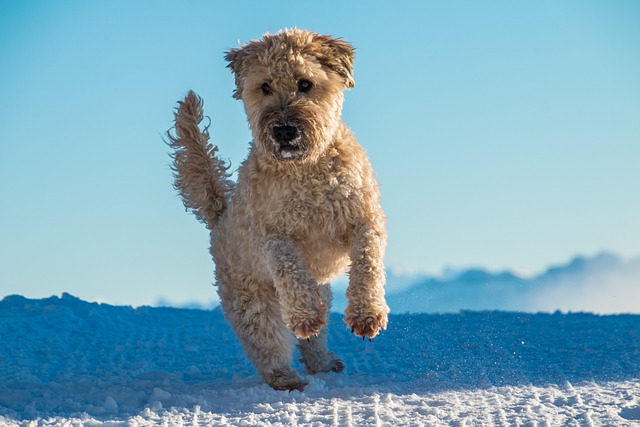


The Soft-Coated Wheaten Terrier, often referred to simply as the Wheaten Terrier, is a medium-sized dog breed known for its friendly personality, energetic nature, and distinctive silky coat. This breed is part of the terrier group and is particularly famous for its unique, soft, and flowing coat that comes in a shade of wheaten (golden beige). Originally bred in Ireland to work as farm dogs, Soft-Coated Wheaten Terriers are known for their playful and affectionate nature. They are highly social dogs, forming strong bonds with their families and often being good with children and other pets. Their intelligence, loyalty, and eagerness to please make them excellent companions for active families.
The Soft-Coated Wheaten Terrier is one of Ireland’s oldest native breeds. It is believed to have been developed in the early 18th century to work as an all-purpose farm dog. Bred to hunt, herd, and guard livestock, this versatile terrier was used on farms to keep vermin at bay and assist with other chores. Its characteristic soft, silky coat was a practical feature for surviving the harsh Irish weather. The breed was originally known as the "Wheaten Terrier" due to its coat color and texture, and the "Soft-Coated" distinction was later added to emphasize the breed's unique coat. The Soft-Coated Wheaten Terrier gained popularity in the United States in the 1940s and was officially recognized by the American Kennel Club (AKC) in 1973.
The Soft-Coated Wheaten Terrier is a medium-sized dog with a sturdy and compact build. Adult Wheaten Terriers typically stand between 17 to 19 inches tall at the shoulder and weigh between 30 to 40 pounds. They have a soft, silky, and flowing coat that is the breed's signature feature. The coat is often described as "wheaten," which refers to its soft golden beige color, though it can range from pale cream to a darker golden hue. Their coat requires regular grooming to prevent matting and to keep it looking its best. Wheaten Terriers have a strong, muscular body with a broad chest, short back, and well-proportioned legs. Their head is broad with a gentle, expressive face, and their eyes are dark and almond-shaped. They have a black nose and a tail that is typically carried high and curving gently over the back.
The Soft-Coated Wheaten Terrier is known for its friendly, affectionate, and social nature. They are typically good with children and other pets, making them an ideal family dog. Despite their terrier background, which is often associated with boldness and independence, Wheaten Terriers are gentle and eager to please. They are highly intelligent and enjoy being around people, often seeking attention and affection from their owners. Their playful nature makes them excellent companions for active families. Wheaten Terriers are also known for their sense of humor and can be quite entertaining. While they can be a little reserved with strangers, they are generally not aggressive and can warm up to new people over time. Like many terriers, they may have a strong prey drive, but they are usually not overly territorial or prone to aggression.
The Soft-Coated Wheaten Terrier is an active breed that requires regular exercise to stay healthy and happy. Although not as high-energy as some other terriers, Wheaten Terriers still enjoy daily walks, play sessions, and mental stimulation. They are very agile and can excel in dog sports such as agility, obedience, and even tracking. Wheaten Terriers are playful and enjoy activities like fetch, running, and hiking with their families. Due to their intelligence, they also thrive on mental challenges, such as puzzle toys or interactive games that engage their problem-solving skills. It is important to provide enough exercise to prevent boredom, as a bored Wheaten Terrier may resort to digging or other undesirable behaviors. They are well-suited to active families or individuals who can provide them with both physical and mental stimulation.
Soft-Coated Wheaten Terriers are intelligent and eager to please, which makes them relatively easy to train. However, they can also be a bit independent and stubborn, which means consistent, positive reinforcement methods work best. They respond well to training that involves praise, treats, and play. Early socialization is important for Wheaten Terriers to ensure that they are well-adjusted and comfortable around different people, animals, and environments. Positive exposure to various sights, sounds, and experiences will help prevent shyness or fearful behavior as they grow older. Due to their playful and affectionate nature, Wheaten Terriers are typically good with children and other pets if raised in a well-socialized environment. As with most terriers, their strong prey drive can be managed with proper training and supervision.
The Soft-Coated Wheaten Terrier is generally a healthy breed, but like all dogs, it is prone to certain health conditions. Common health issues in Wheaten Terriers include hip dysplasia, allergies, protein-losing nephropathy (a kidney disease), and hypothyroidism. Regular veterinary check-ups and a healthy diet are essential for maintaining the breed's health. As with any breed, early detection of health issues can help ensure a long and happy life. Grooming is an essential part of caring for a Soft-Coated Wheaten Terrier. Their silky coat requires regular brushing to prevent tangles and matting, and they may need professional grooming every few months to keep their coat in top condition. They are considered a low-shedding breed, but their coat still requires attention. Wheaten Terriers also need regular ear cleaning, as their floppy ears can trap moisture and debris, leading to infections.
The average lifespan of a Soft-Coated Wheaten Terrier is around 12 to 14 years. With proper care, including a balanced diet, regular exercise, and routine veterinary care, they can live a long, healthy life. It is important to monitor their health, especially as they age, and to watch for signs of common breed-specific conditions such as kidney disease or thyroid problems. Regular check-ups with a veterinarian and a healthy lifestyle can help ensure that your Wheaten Terrier stays happy and active in their senior years.
© copyright Dog Compendium 2024 - 2026